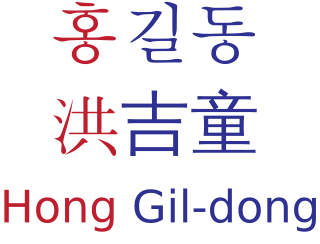| Common spelling | Sex | McCune–
Reischauer | Revised Romanization | Hangul | Hanja |
|---|
| Gun | Masculine | Kŏn | Geon | 건 | 建 (䢖), 乾 (漧, 乹), 件, 健, 巾, 虔, 楗, 鍵, 愆, 腱, 蹇, 騫, 搴, 湕, 踺, 揵, 犍, 犍, 褰, 謇, 鞬 |
| Kwang | Masculine | Kwang | Gwang | 광 | 光 (炛, 炚), 廣 (広), 鑛, 狂, 侊, 洸, 珖, 桄, 匡, 曠, 壙, 筐, 胱, 恇, 框, 爌, 獷, 磺, 絖, 纊, 茪, 誆, 誑, 硄 |
| Ran | Feminine | Ran | Ran | 란 | 卵, 亂, 蘭, 欄, 瀾, 瓓, 丹, 欒, 鸞, 爛, 鑾, 嬾, 幱, 攔, 灓, 襴, 闌, 斕, 欗 |
| Lee | Unisex | Ri | Ri | 리 | 里, 理, 利, 梨, 李, 吏, 離 (离), 裏 (裡), 履, 俚, 莉, 莉, 俐 (悧), 唎, 浬, 狸, 痢, 籬, 罹, 羸, 釐 (厘), 鯉, 涖, 𢻠, 犂 (犁), 摛, 剺, 哩, 嫠, 莅, 蜊, 螭, 貍, 邐, 魑, 黐, 漓, 灕 |
| Lin | Feminine | Rin | Rin | 린 | 鄰 (隣), 潾, 璘, 麟 (𪊭), 吝, 燐, 藺, 躪, 鱗, 撛, 鏻, 獜, 橉, 粦, 粼, 䗲, 繗, 嶙, 悋, 磷, 驎, 躙, 轔, 斴, 焛, 暽, 瞵 |
| San | Masculine | San | San | 산 | 山, 産, 傘, 珊 |
| Sang | Unisex | Sang | Sang | 상 | 上, 常, 賞, 商, 相, 霜, 想, 傷, 喪, 嘗, 裳, 詳, 祥, 象, 像, 床, 桑, 狀, 償, 庠, 湘, 箱, 翔, 爽, 塽, 孀, 峠, 廂, 橡, 觴, 樣, 牀, 慡, 潒, 徜, 晌, 殤, 甞, 緗, 鎟, 顙, 鬺 |
| Seol | Feminine | Sŏl | Seol | 설 | 雪, 說, 設, 舌, 薛, 楔, 屑, 泄, 洩, 渫, 褻, 齧, 禼 (卨), 蔎, 契, 偰, 㨹, 媟, 揲, 暬, 爇, 碟, 稧, 紲, 枻 |
| Seong | Unisex | Sŏng | Seong | 성 | 姓, 性, 成, 城, 誠, 盛, 省, 聖 (聖), 聲, 星, 珹, 娍, 瑆, 惺, 醒, 宬, 猩, 筬, 腥, 貹, 胜, 成, 城, 誠, 盛, 晟 (晟, 晠), 𦖤, 騂 |
| Woong | Masculine | Ung | Ung | 웅 | 雄, 熊 |
| Eun | Unisex | Ŭn | Eun | 은 | 恩, 銀, 隱, 垠, 殷, 誾, 溵, 珢, 慇, 濦, 㒚, 听, 𤨒, 圻, 蘟, 檼, 檃, 訢, 蒑, 泿, 蒽, 憖, 圁, 嶾, 𪙤, 𰜩, 嚚, 垽, 狺, 癮, 訔, 鄞 |
| Jae | Unisex | Chae | Jae | 재 | 才, 材, 財, 在, 栽 (㘽), 再, 哉, 災, 裁, 載, 宰, 梓, 縡, 齋, 渽, 滓, 齎, 捚, 賳, 溨, 夈, 崽, 扗, 榟, 灾, 纔 |
| Ji | Unisex | Chi | Ji | 지 | 只, 支, 枝, 止, 之, 知 (𥎵), 地, 指, 志, 至, 紙, 持, 池, 誌, 智 𥏾), 遲, 旨, 沚, 址, 祉, 趾, 祗, 芝, 摯, 鋕, 脂, 咫, 枳, 漬, 砥, 肢, 芷, 蜘, 識, 贄, 洔, 厎, 汦, 吱, 馶, 劧, 忯, 坁, 搘, 禔, 觗, 坻, 墀, 榰, 泜, 痣, 秪, 篪, 舐, 踟, 躓, 軹, 阯, 鮨, 鷙, 扺, 扺, 潪 |
| Jin | Unisex | Chin | Jin | 진 | 辰, 眞 (真), 進, 盡 (尽), 振, 鎭, 陣, 陳, 珍 (鉁), 震, 晉 (晋), 瑨 (𤨁), 瑱, 津, 津, 秦, 軫, 塵, 禛, 診, 縝, 塡, 賑, 溱, 抮, 唇, 嗔, 搢, 桭, 榛, 殄, 殄, 疹, 瞋, 縉, 臻, 蔯, 袗, 䑐, 蓁, 昣, 枃, 槇, 稹, 儘, 靕, 敒, 眹, 侲, 珒, 螴, 趁, 鬒, 愼, 滇, 誫, 轃 |
| Chan | Masculine | Ch'an | Chan | 찬 | 贊 (賛), 讚 (讃), 撰, 纂, 粲, 澯, 燦, 璨, 瓚, 纘, 鑽, 竄, 餐, 饌, 攢, 巑, 儹 (儧), 篡 (簒), 欑, 㜺, 劗, 爨, 趲, 攛 |
| Chul | Masculine | Ch'ŏl | Cheol | 철 | 鐵 (鉄), 哲 (喆), 徹, 澈, 撤, 轍, 綴, 凸, 輟, 悊, 瞮, 剟, 啜, 埑, 惙, 掇, 歠, 銕, 錣, 飻, 餮 |
| Hyuk | Masculine | Hyŏk | Hyeok | 혁 | 革, 赫, 爀, 奕, 焱, 侐, 焃, 𧹽, 嚇, 弈, 洫, 鬩 |
| Hyun | Unisex | Hyŏn | Hyeon | 현 | 現, 賢, 玄, 玄, 絃, 縣, 懸, 顯 (顕), 見, 峴, 峴, 泫, 炫, 玹, 鉉, 眩, 昡, 絢, 呟, 俔, 睍, 舷, 衒 (䝮), 弦, 儇, 譞, 怰, 䧋, 鋗, 㢺, 琄 , 嬛, 娊, 妶, 灦, 㭹, 駽, 痃, 繯, 翾, 蜆, 誢, 讂 |
| Ho | Masculine | Ho | Ho | 호 | 虎, 皓 |
| Hoon | Masculine | Hun | Hun | 훈 | 訓, 勳 |

